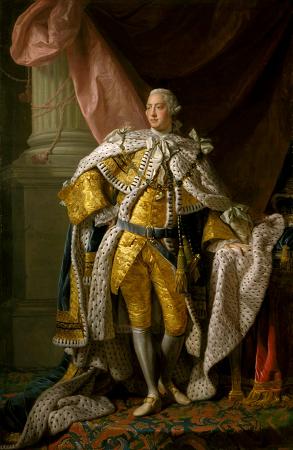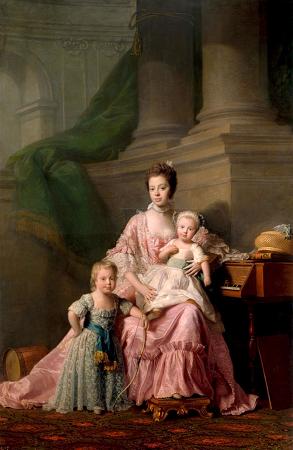Queen Charlotte (1744 - 1818). Charlotte of Mecklenburg-Strelitz was the wife of King George III. She served as Queen consort of Great Britain and Ireland from her wedding in 1761 until the union of the two kingdoms in 1801, after which she was queen consort of the United Kingdom of Great Britain and Ireland until her death in 1818. She was also the Electress consort of Hanover in the Holy Roman Empire until the promotion of her husband to King of Hanover on 12 October 1814, after which she was also queen consort of Hanover. Charlotte was a patron of the arts and an amateur botanist who helped expand Kew Gardens. She was distressed by her husband's bouts of physical and mental illness, which became permanent in later life and resulted in their eldest son George's appointment as Prince Regent in 1811. George III and Charlotte had 15 children in total, 13 of whom survived to adulthood. They included two future British monarchs, George IV and William IV; Charlotte, Queen of Württemberg; Prince Edward, Duke of Kent and Strathearn, the father of Queen Victoria; and Ernest Augustus, King of Hanover. Sophia Charlotte was born on 19 May 1744. She was the youngest daughter of Duke Charles Louis Frederick of Mecklenburg and of his wife Princess Elisabeth Albertine of Saxe-Hildburghausen. Mecklenburg-Strelitz was a small north-German duchy in the Holy Roman Empire. The children of Duke Charles were all born at the Unteres Schloss in Mirow. According to diplomatic reports at the time of her engagement to George III in 1761, Charlotte had received a very mediocre education. Her upbringing was similar to that of a daughter of an English country gentleman. She received some rudimentary instruction in botany, natural history and language from tutors, but her education focused on household management and on religion, the latter taught by a priest. Only after her brother Adolphus Frederick succeeded to the ducal throne in 1752 did she gain any experience of princely duties and of court life. When King George III succeeded to the throne of Great Britain upon the death of his grandfather, George II, he was 22 years old and unmarried. His mother and advisors were anxious to have him settled in marriage. The 17-year-old Princess Charlotte of Mecklenburg-Strelitz appealed to him as a prospective consort partly because she had been brought up in an insignificant north German duchy and therefore would probably have had no experience or interest in power politics or party intrigues. That proved to be the case; to make sure, he instructed her shortly after their wedding not to meddle, a precept she was glad to follow. The King announced to his Council in July 1761, according to the usual form, his intention to wed the Princess, after which a party of escorts, led by the Earl Harcourt, departed for Germany to conduct Princess Charlotte to England. They reached Strelitz on 14 August 1761, and were received the next day by the reigning duke, Princess Charlotte's brother, at which time the marriage contract was signed by him on the one hand and Earl Harcourt on the other. Three days of public celebrations followed, and on 17 August 1761, the Princess set out for Britain, accompanied by her brother, Duke Adolphus Frederick, and by the British escort party. On 22 August, they reached Cuxhaven, where a small fleet awaited to convey them to England. The voyage was extremely difficult; the party encountered three storms at sea, and landed at Harwich only on 7 September. They set out at once for London, spent that night in Witham, at the residence of Lord Abercorn, and arrived at 3:30 pm the next day at St. James's Palace in London. They were received by the King and his family at the garden gate, which marked the first meeting of the bride and groom. At 9:00 pm that same evening, within six hours of her arrival, Charlotte was united in marriage with King George III. The ceremony was performed at the Chapel Royal, St. James's Palace, by the Archbishop of Canterbury, Thomas Secker. Only the royal family, the party who had travelled from Germany, and a handful of guests were present. Upon her wedding day, Charlotte spoke no English. However, she quickly learned English, albeit speaking with a strong German accent. One observer commented, She is timid at first but talks a lot, when she is among people she knows. Less than a year after the marriage, on 12 August 1762, the Queen gave birth to her first child, George, Prince of Wales. In the course of their marriage, the couple became the parents of 15 children, all but two of whom survived into adulthood.
more...






